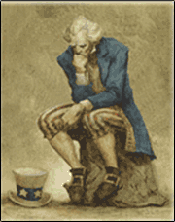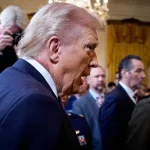
–>
September 9, 2022
A prosecutor who uses his or her authority to virtue signal to the public to advance his or her political career is more dangerous to society than all but the most violent criminals.
‘); googletag.cmd.push(function () { googletag.display(‘div-gpt-ad-1609268089992-0’); }); }
Insurance will cover many forms of property crimes, and you can legally use deadly force against somebody who menaces you with death or serious bodily injury.
A prosecutor, though, can bankrupt most people by filing unfounded criminal charges against them, ruin their lives with prison time and criminal records. Unless the case is particularly egregious like that of Mike Nifong (D-NC), or with crooked judges like Mark Ciavarella (D-PA, a.k.a., federal inmate #15008-067) or Mike Conahan (D-PA, home arrest), there is little or no recourse against these “jurists.”
To put this in perspective, Pennsylvania attorney Frank Fina was suspended from the practice of law for his role in convicting Penn State President Graham Spanier of putting children at risk. Pennsylvania’s current Attorney General, and gubernatorial candidate Josh Shapiro (D-PA), worked hard to reinstate Spanier’s conviction while tweeting that Spanier had been told that Jerry Sandusky was sexually assaulting children on the Penn State campus. The witness, Mike McQueary, testified, however, under oath, that he did not see Sandusky do anything he deemed reportable to police while his father and a family friend, both of whom are mandated by law to report abuse, did not encourage him to report to child protective authorities whatever he thought he might have possibly heard.
‘); googletag.cmd.push(function () { googletag.display(‘div-gpt-ad-1609270365559-0’); }); }
I believe that Shapiro, like Scott Harshbarger (D-MA) and Martha Coakley (D-MA) who ruined the lives of the Amiraults, used his position to “virtue signal” his concern for the children prior to the election. The latter is my perception of Shapiro, Harshbarger, and Coakley rather than a statement of fact because I cannot read their minds.
Kyle’s Law
Attorney Andrew Branca, whose opinions often appear on William Jacobson’s blog Legal Insurrection, has proposed what he calls Kyle’s Law due to what he and I both regard as a politically motivated prosecution of Kyle Rittenhouse for what was obviously self-defense.
“Too often, rogue prosecutors bring felony criminal charges against people who were clearly doing nothing more than defending themselves, their families, or others from violent criminal attack. …The only motivation of the prosecutor is personal aggrandizement and political capital.” Kyle’s Law would sanction not only the jurisdiction but also the prosecutor who brings a junk case, to be defined as one in which the prosecutor lacks even preponderance of evidence rather than beyond a reasonable doubt that the defendant did anything wrong.
The American Bar Association’s Rules of Professional Conduct state meanwhile, “A lawyer shall not bring or defend a proceeding, or assert or controvert an issue therein, unless there is a basis in law and fact for doing so that is not frivolous…” and also “The prosecutor in a criminal case shall: (a) refrain from prosecuting a charge that the prosecutor knows is not supported by probable cause…” and probable cause requires a “reasonable belief” that the defendant has committed a crime.
If, for example, a video of a self-defense shooting shows clearly that the person who was shot initiated a deadly confrontation, perpetuated it by not allowing the subject of their attack to retreat in complete safety, and menaced the shooter with immediate deadly force, as did all three of Rittenhouse’s assailants, that’s proof beyond a reasonable doubt in favor of the shooter that the shooting was justified. If we look within the four corners of the charges against Rittenhouse, the prosecutors did not contest this version of the events. Joseph Rosenbaum initiated a confrontation in which he attempted to strong-arm rob Rittenhouse (a violent felony by itself) of a firearm he could have turned against Rittenhouse on the spot and also one which, as a convicted felon, it was unlawful for Rosenbaum to handle. Anthony Huber the domestic abuser was a member of a mob (which constitutes disparity of force and therefore deadly force) that pursued Rittenhouse while yelling violent threats, thus putting Rittenhouse in reasonable fear for his life and denying him the opportunity to retreat in complete safety. He then menaced and struck Rittenhouse with a deadly contact weapon when Rittenhouse was on the ground. The third man, Gaige Grosskreutz, pursued Rittenhouse with a drawn handgun, which again constituted an implied threat, along with the immediate means of carrying it out.
‘); googletag.cmd.push(function () { googletag.display(‘div-gpt-ad-1609268078422-0’); }); } if (publir_show_ads) { document.write(“
Another example would be, for example, if a politically ambitious prosecutor had tried to show his “woke” credentials by charging the officer who shot Hakim Littleton even though the latter was on bodycam video firing a handgun at the head of another officer at roughly three paces. It was fortunate that Littleton was a bad shot or it would have been “end of watch” for that officer or, as Black Lives Matter and Antifa would put it, he would have “oinked his last.” This did not, however, happen because the local prosecutors saw the open and shut case of self-defense.
Poster Children for Kyle’s Law
- The Amiraults were convicted on the basis of “evidence” that included, among other things, accusations that one of them sexually assaulted a boy with a butcher knife that somehow left no injuries, along with a “secret room” and a “magic room” that were never found.
- Police officer Grant Snowden was railroaded to prison on the watch of Janet Reno (D-FL).
- Police officer Garrett Rolfe was charged with murder for shooting Rayshard Brooks after Brooks took an officer’s Taser, which the prosecutor stipulated is a deadly weapon under Georgia law, and discharged it at the officers. The charges were finally dropped but should have never been filed.
- Nikolas Fernandez was charged with felony assault for shooting Daniel Gregory, who reached through the window of Fernandez’s car to punch him. Gregory even admitted openly, “I catch him, I punch him in the face.” He claims that he was trying to stop Fernandez from running over “demonstrators” but the video shows clearly that Fernandez had come to almost a complete stop by the time Gregory reached into his car. Note also the barrier that another “demonstrator” shoves in front of the car which a reasonable person would construe as a prelude to a carjacking or Reginald Denny-style beating.
- Here is a long list of wrongful convictions in the United States, some of which involved willful prosecutorial misconduct and/or misconduct by rogue police officers eager to get convictions no matter what.
Prosecutors should not be afraid to do their jobs just as police officers should not be afraid to do their jobs. Kneeling on a helpless suspect’s neck as Derek Chauvin was convicted of doing is not, however, a police officer’s job, and Chauvin is now in prison as a result. Junk prosecutions whose sole identifiable purpose, at least from the perspective of a reasonable person, noting that nobody can read the prosecutor’s mind, is to advance a prosecutor’s legal and/or political career, should similarly bring the consequences recommended in Kyle’s Law and maybe professional disciplinary action as well.
Civis Americanus is the pen name of a contributor who remembers the lessons of history, and wants to ensure that our country never needs to learn those lessons again the hard way. He or she is remaining anonymous due to the likely prospect of being subjected to “cancel culture” for exposing the Big Lie behind Black Lives Matter.
Image: Gage Skidmore, via Wikimedia Commons // CC BY-SA 2.0
<!– if(page_width_onload <= 479) { document.write("
“); googletag.cmd.push(function() { googletag.display(‘div-gpt-ad-1345489840937-4’); }); } –> If you experience technical problems, please write to [email protected]
FOLLOW US ON
<!–
–>
<!– _qoptions={ qacct:”p-9bKF-NgTuSFM6″ }; ![]() –> <!—-> <!– var addthis_share = { email_template: “new_template” } –>
–> <!—-> <!– var addthis_share = { email_template: “new_template” } –>







